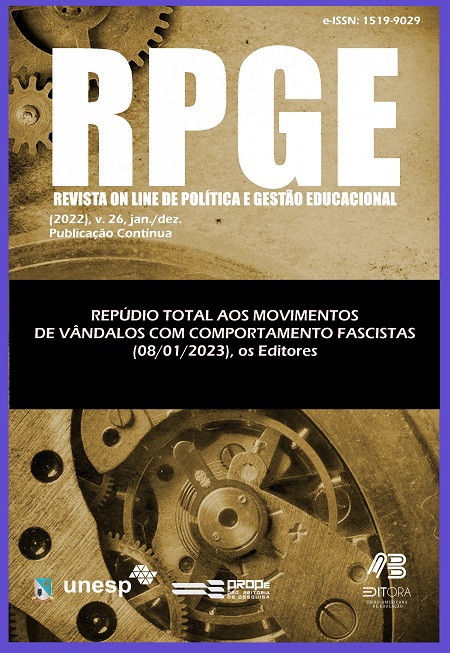Formación de la comunicación digital en la actividad organizativa y pedagógica de la universidad
DOI:
https://doi.org/10.22633/rpge.v26i00.17330Palabras clave:
Comunicación digital, Entorno digital universitario, Recursos educativos, DigitalizaciónResumen
Los autores realizaron un estudio sociológico con un mayor análisis de las oportunidades y amenazas asociadas con la introducción del entorno digital en el. Los criterios propuestos para la modelización de la digitalización se centran en activar el potencial innovador y creativo de los estudiantes, la actividad científica y proyectual del profesorado, así como en mejorar el nivel profesional de formación del personal y los empleados de la universidad, incluyendo la contribución al desarrollo personal y mejorar la eficiencia laboral. Estos criterios permiten que la marca universitaria tome una posición estable en un entorno competitivo y amplíe el público objetivo. La introducción de un entorno digital de información y comunicación estabiliza el desarrollo económico de la universidad y, como resultado, amplía las opciones de asociaciones, proyectos científicos y educativos de gran escala que dan derecho a ingresar al espacio sociocultural moderno de el país y el mundo.
Descargas
Citas
DUDIN, M. N. et al. Situation and problems of digitation of university management in Russia and in three Latin-American countries (Argentina, Chile, and Brazil). Formacion Universitaria, v. 13, n. 6, p. 61-76, 2020. Available in: https://www.elibrary.ru/item.asp?id=45030663. Access in: 20 Jan. 2022.
EVSIKOVA, T. et al. Development of information culture as a key attribute of a modern specialist in the process of training future translators. Revista EntreLinguas, Araraquara, v. 8, n. esp. 1, Mar. 2022. Available in: https://periodicos.fclar.unesp.br/entrelinguas/article/view/16938. Access in: 03 Feb. 2022.
GONCHAROVA, M.; GONCHAROVA, N. Reloading the system of higher education in the conditions of the formation of the digital educational environment in the Russian Federation. Psychological and pedagogical journal Gaudeamus, v. 18, n. 4, 42, p. 7-14, 2019.
HERNÁNDEZ DE VELAZCO, J. J. et al. Relevance and social responsibility of sustainable university organizations: analysis from the perspective of endogenous capacities. Entrepreneurship and Sustainability Issues, v. 7, n. 4, p. 2967-2977, 2020. Available in: https://jssidoi.org/jesi/article/565. Access in: 20 May 2022.
KLIMOV, A. et al. About the Digital Ecosystem of The Modern University. Modern Information Technologies and It Education, v. 15, n. 4, p. 815-824, 2019.
KUZ'MIN, P. Semiotic method for knowing reality: limits of applicability. Bulletin of the Russian university of friendship of peoples. Series: theory of language. Semiotics. Semantics RUDN, v. 10, n. 3, p. 610-621, 2019.
RETS, N. et al. Effectiveness of foreign language teaching techniques: provision of feedback as a way to correct writing mistakes. Revista EntreLinguas, Araraquara, v. 8, n. esp. 1, Mar. 2022. Available in: https://periodicos.fclar.unesp.br/entrelinguas/article/view/16934. Access in: 18 Apr. 2022.
SANCHEZ, J. J.; ALEMAN, E. Teachers’ opinion survey on the use of ICT tools to support attendance-based teaching. Computers & Education, v. 56, n. 3, p. 911-915, Apr. 2011. Available in: https://www.sciencedirect.com/science/article/abs/pii/S036013151000326X. Access in: 02 May 2022.
SLEPOV, V. A. et al. Methodological Approaches to Financing Higher Education Institutions in the Context of Digitalizing the Russian Higher Education. Revista Tempos e Espaços em Educação, v. 14, n. 33, 2021. Available in: https://seer.ufs.br/index.php/revtee/article/view/15928. Access in: 23 Feb. 2022.
USACHEVA, O.; CHERNYAKOV, M. Assessment of the readiness of higher educational institutions for the transition to a digital educational environment. Vysshee obrazovanie v Rossii, v. 29, n. 5, p. 53-62, 2020. Available in: https://vovr.elpub.ru/jour/article/view/2247?locale=en_US. Access in: 13 Oct. 2021.
VAN HEERDEN, D.; GOOSEN, L. Information and Communication Technologies to Change Education. Conference: Proceedings of the South Africa International Conference on Education, 2020. Available in: https://www.researchgate.net/publication/346717946_Information_and_Communication_Technologies_to_Change_Education. Access in: 17 Feb. 2022.
VANYUSHKINA, V. University brand in digital educational environment. Bulletin of the RSEU, n. 4, p. 26-33, 2019.
VDOVINA, M. et al. The impact of digitalization on social and pedagogical work development. Nuances: Estudos sobre Educação, Presidente Prudente, v. 32, e021021, Jan./Dez. 2021. Available in: https://revista.fct.unesp.br/index.php/Nuances/article/view/9209/pdf_1. Access in: 08 Feb. 2022.
ZHAROV, A. N. et al. Impact of the Pandemic on the Learning Process of Foreign Students Studying in Russia and Prospects for Educational Migration. European Journal of Contemporary Education, v. 11, n. 2, p. 582-591, 2022.
Descargas
Publicado
Cómo citar
Número
Sección
Licencia
Derechos de autor 2022 Revista on line de Política e Gestão Educacional

Esta obra está bajo una licencia internacional Creative Commons Atribución-NoComercial-CompartirIgual 4.0.
Manuscritos aceitos e publicados são de propriedade da Revista on line de Política e Gestão Educacional. É vedada a submissão integral ou parcial do manuscrito a qualquer outro periódico. A responsabilidade do conteúdo dos artigos é exclusiva dos autores. É vedada a tradução para outro idioma sem a autorização escrita do Editor ouvida a Comissão Editorial Científica.










